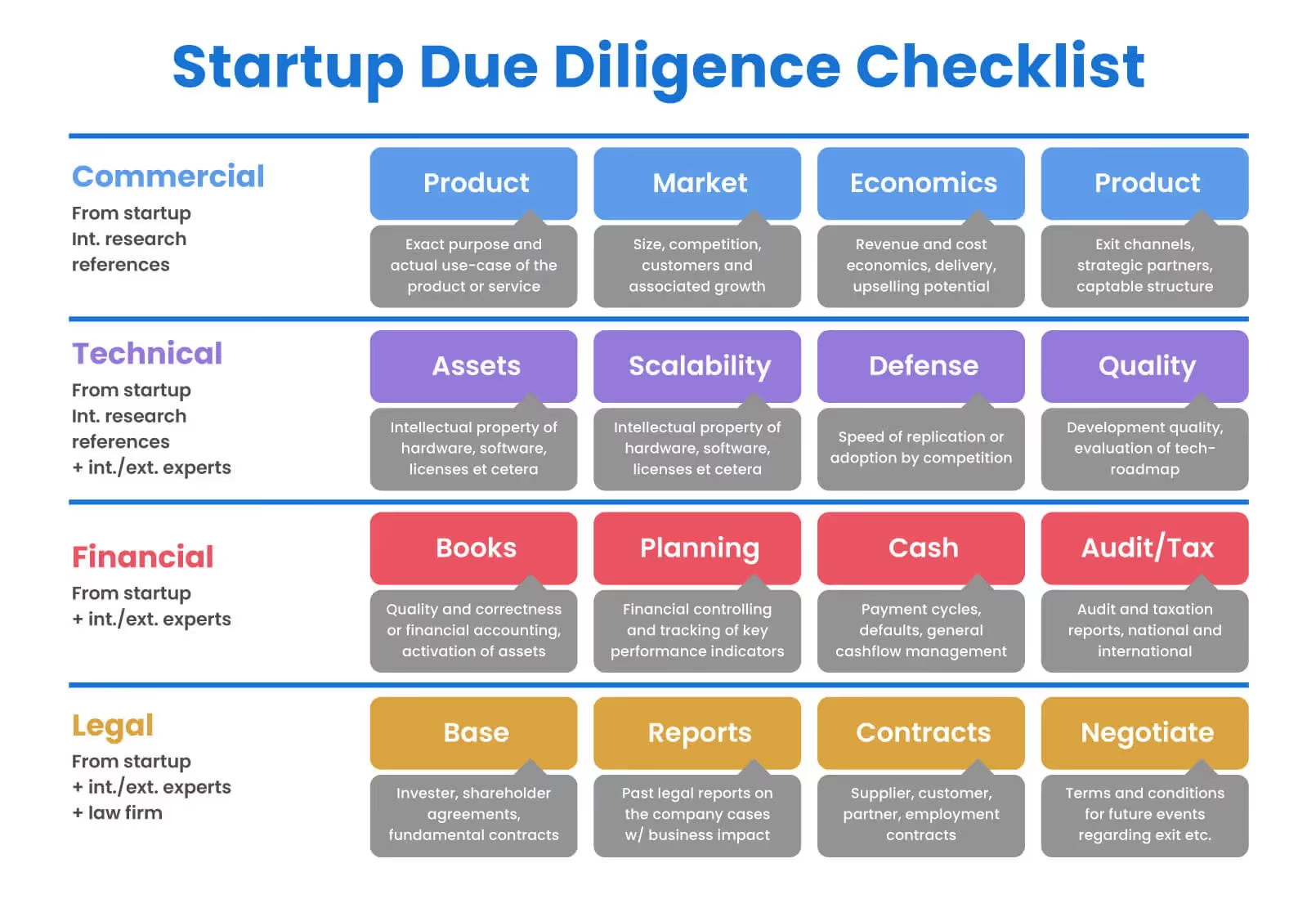Understanding due diligence and how to conduct it is essential for startups.
In the context of startups, due diligence refers to the audit of the company carried out by angel and VC investors before deciding whether to invest or not. Hence, good due diligence practice is vital to the ability of any startup which is fundraising.

How to prepare a startup for due diligence
Everyone that has ever watched Shark Tank, Dragon’s Den, or any show where millionaire investors put startup entrepreneurs through their paces will be familiar with due diligence.
At some points during the show, the investors are enthused about a company being presented to them, its financials, and the growth projected.
The presentation is slick and confident, and then… it’s over because the entrepreneur withheld something which was really important.
It could be hidden debt, a pending lawsuit with a previous partner, or some form of an ethical issue around the product being presented.
But most viewers will tend to recognize that moment when they know that this uncovered piece of information means the investor will never get their money (and perhaps nobody else).
The entrepreneur - and the viewers - have just received a crash course in the importance of due diligence and learned things like:
- how to prepare startup financial and legal info
- how to prepare intellectual property info
- how to prepare business entity info and explore how to get a virtual business address in case you are running an e-commerce business and you need to have an address that you can use to ship orders and accept returns from customers
- how to show HR and employees information
- how to show that you are diversified enough
and many more.

Why is due diligence carried out?
An example of the chit-chat that occurs between startup founders and investors is Shark Tank and shows like it. This is an informal introduction to due diligence.
In reality, due diligence is a far more formal and structured process, whereby every aspect of the business is analyzed in detail by the investors.
For their part, the startup founders should also be completely transparent in their dealings with the investors, as to not do so generally scuppers any chance of investment.
When is due diligence carried out?
Informal due diligence starts the moment that an investor engages with a startup.
The seemingly casual questions that an investor asks are used to define the company in broad terms. After the term sheet is agreed upon by the startup and the investor, the process can begin in earnest.
At this point, the investor - almost always a venture capital (VC) investor - will send the startup a venture capital due diligence request list, outlining a series of information requests.
From here, the amount of time that due diligence takes is a function of the complexity of the company and its ecosystem, the speed at which documents can be retrieved, and the speed at which the VC investor requests and analyzes the information.
Naturally, the process will also slow down, or come to a halt entirely, if irregularities arise during this process. At a minimum, the process should take 2-3 weeks, and could extend up to 2 months.
What are investors looking for in due diligence?
The short answer is: Everything.
That doesn’t mean they’ll trawl through every document the startup has ever produced. For VC investors conducting due diligence on several startups at a time, that would take too long.
Instead, they tend to have structured processes, which they adapt to the circumstances. These are divided into several separate areas, with some crossover between the areas.
We look a little closer at each of these areas below:

1. The Product or Service
If you’ve gotten to due diligence, it is more than likely that the investor has taken an interest in your product or service.
Whether it’s a physical product, an online service, a mobile application, or anything else, they’ll be looking for certain common characteristics: Scalability, IP protection for the product or service, unit margins, and production process.
In the case of software, they’ll usually ask to see the source code.
2. The Market
Research of the market is usually conducted in tandem with product due diligence.
This is where investors often turn the questions onto the entrepreneur to understand where they see their company’s positioning in the market.
The investors will answer questions about the market size (it’s important for investors to know their TAM, SAM, and SOM) and how and why the company has a clear pathway for growth within the market.
3. The People
At its most fundamental, the investment that a VC investor makes in a startup is a business relationship.
This means that they have to believe in you and your team, your collective history, ability, and integrity.
It hasn’t been unknown for a VC firm to pull out of a deal that possessed all of the characteristics that suggested a good investment but simply didn’t believe in the team behind it.
4. The Financials
VC investors like to see high revenue growth, strong margins, and - this is important - good use of cash.
In giving their cash to the startup, they’re essentially trusting someone they don’t know to be good custodians of their money.
They’ll fully expect the entrepreneurs projected figures of the company’s future performance to be ambitious but if they’re too ambitious, but if they’re too ambitious, and the numbers look completely unrealistic, the entrepreneur will end up losing credibility.
5. Equity Structure
VC investors are used to contrived equity structures, which feature different chunks of equity given over to early stage investors (including family and friends), co-founders, angel investors, and other VC investors.
They’ll look to see when each funding round happened, where the cash was spent, and what terms the existing investors have.
In particular, they’ll be looking for stipulations around debt and any clauses that may exist within preferred shares.
6. Risk
It bears repeating that VC investors are used to risk, but that doesn’t mean they take a flippant attitude towards it.
In fact, they have developed a number of measures to mitigate risks if and when they arise.
One such measure is the directors and officers insurance policy (“D&O” in industry jargon), which protects company management (of which the VC firm will form a part) from any legal claims made against the company.
Where issues usually arise in venture capital due diligence
Your business has to be watertight to gain VC funding.
Some of those issues are within the control of the startups' management (good documentation) and some aren’t (pathway to growth).
Unfortunately, most of the issues that turn VC investors off are in the latter category. For the record, here is a list of the most common issues that make VC investors turn down investment in a startup:
- IP Protection: This is a broad category but extremely relevant when looking at technology startups. Even if a company has a cool idea and good traction, what’s to stop a tech giant from offering the same product at scale for free? If the company does have IP protection, what does it cover? Also, some products or services, by their nature, aren’t patentable, so then it becomes a ‘first come first served for new markets.
- External Stakeholder Reviews: VC investors tend to maintain large networks in a broad range of industries that they can call on when they need to. When a new potential investment comes along in an industry they’re not immediately familiar with, they’ll lean on their network for advice. When the answer to the question, “is this investable?” comes back less than glowingly positive, they’ll be inclined to refuse, however, impressed they themselves are with the company.
- Team Cohesiveness: For young entrepreneurs, the day-to-day running of a company can be a high paced, pulsating affair, where every day seems like a new opportunity. By contrast, having to deal with the bureaucracy of due diligence may seem like a trudge. A manager’s ability to get his or her team through this will send a signal to the investors that they’re investing in the right people. By contrast, cutting corners will send quite the opposite signal.
Why should startups be grateful for due diligence?

Due diligence is an opportunity for a startup to improve. Companies spend millions of dollars every year paying high-end startup consultants to tell them where the issues are in their company, its operations, and its financials.
With VC due diligence, the company gets all of that for free.
And in the end, if they’ve performed well, they may even get a few million dollars into the bargain. What’s not to embrace about a process like that?
The DealRoom suite has been designed to cater to startups as well as more mature companies.
Our platform has templates especially geared towards the venture capital due diligence process, outlining the issues and documents that your company will be asked about.
Our virtual data room also sends a signal to investors that you’re serious about this. Talk to us today about how our technology can work for you.
Startup due diligence checklist

Corporate Information and Structure
- An organizational chart including all relevant shareholdings, branches, and places of business
- Up-to-date Articles of Incorporation, Amendments, and By-Laws
- Describe the company's core activities and what it does in addition.
- Documentation of the chain of transfer of the shares/partnership interests to their current holders, incl. sale and purchase agreements as well as a certificate of incorporation
- List of all current shareholders including the size of respective shareholding and capitalization table
- "Provide copies of any agreements where third-party consent is required for any
- transaction."
- Prepare all minutes of shareholders' & partners' meetings and resolutions.
- Furnish minutes of the meetings of any advisory board (or their committees)
- Copies of all agreements pertaining to the shares/partnership interests (including but not limited to pledges, security interests, options, nominee ships, trust agreements, usufruct, and sub-participations).
- Provide details about any capital changes in the company from the date of incorporation
- Background and Contact information of all managing directors and members of the advisory board and their committees
Material Importance Agreements
- Overview of all marketing, service, and distribution agreements (including key details)
- Overview of agreements with major customers (general terms of business, framework agreements, etc.), if any (including key details)
- Overview of all material suppliers and customers by product line and region (including key details and any discounts if applicable)
- All joint venture and co-operation agreements/ descriptions, if any with other enterprises
- List of loan agreements, guarantee agreements, contracts of suretyship, and other agreements regarding liabilities of third parties (including key details)
- Summary list of all Shareholder's loans
- Security agreements, pledges, mortgages, and other agreements establishing the rights of third parties to assets of the entities
- List of all leases, financial leases, distribution agreements, and any other contracts involving continuous obligations (including a summary of their contents)
- List of main contracts with suppliers including key terms
- Main contracts with distributors, licensees, agents, or other persons involved in the distribution
- Review all Secrecy agreements
- All major existing consultancy agreements
- List of all main insurance contracts including descriptions of risks covered and any pending damaging events
- Standard forms used by the entities (including but not limited to general terms and conditions, bills, order forms, or warranties)
- Compilation of a list of all other important agreements, especially those with provisions for change of control or that can only be terminated with a lengthy notice period.
- "Describe the contracts whether written or unwritten that can restrict the activities of the
- Company"
- All agreements with shareholders/partners and related persons, especially employment contracts, advisory agreements, lease agreements, and loan agreements
- All material contracts outside of the ordinary course of business (to the extent that they are not included above)
- Agreements on confidentiality and nondisclosure with employees, partners, suppliers, etc.
General Asset Information
- Provide details of all assets that were acquired, disposed and not in possession of by the Company in the past five years.
- Secure all official copies of any property formerly owned, used or occupied by the Company, or real estate which can be a liability for the Company.
- Provide details of changes in the real estate ownership of the Company or the changes in which the Company used its real estate assets.
- Provide details of all rent, service charge, or any other monetary sum paid by the Company in terms of lease or license pertaining to any real estate asset owned or used by the Company.
Intellectual Property and Technology
- Copies of the Intellectual Property and Invention Agreements signed by key employees and consultants (including those who didn't sign).
- Overview, descriptions, and specs for both owned and developed items, as well as leased/rented products.
- Identify the regulation and status of patents, trademarks, copyrights, licenses, utility models, designs, etc. utilized by the company (applications and pending applications).
- Secure all hardware and software licenses (incl. standard, technical, and accounting software) and maintenance contracts signed by the Company.
- Describe the R&D capabilities and product and technology roadmap for the next few years.
- Provide details of any complaints, disputes or objections, or claims filed regarding the Intellectual Property as well as the technology utilized by the Company.
- Examine whether and how the acquisition may change any licenses, agreements, or arrangements (breach, termination, etc.)
- Analyze the circumstances in which the Company might lose its access to its IP asset, software or hardwares.
- List any data security issues as well as company policies on recording, monitoring, and using the phone system, e-mail system, and internet access
Labor and Employment
- List of the current average number of employees and historic development, by business unit, age profile, pay, lengths of the service profile, and technical skills.
- A list and breakdown of all outstanding accrued salaries, paid time off, and reimbursable expenses.
- Provide information about company pension policies and all members of the pension scheme (including those employees who are not participating).
- Standard form employment contract, including supplementary agreements (on secrecy, employee inventions, prohibition on competition, etc.)
- Information on any severance agreements with employees and former employees which have not been fully completed.
- List any pending or planned offer of employment
- List all loans granted to employees
- Provide details of all perks/benefits the Company will provide to its employees such as company car, life insurance, and health insurance
- "Copies of all offers letters currently sent out by the Company which are
- accepted/not yet accepted."
- Copies of any reports and investigations into health and safety issues, as well as professional illness
- Description of overall management structure and curriculum vitae of management and other key staff members
Accounting and Finance
- Income Statement, Balance Sheets, Cash Flows, and disclosures (for the past 5 years up to date)
- Budget Versus Actual (for the past 5 years up to date)
- Provide information on the Company's debt securities, mortgages, and any other Company property that has been utilized as Collateral.
- Provide details about the capital commitments and capital expenditure
- Monthly internal reporting for the last 5 years (management financial reports)
- Breakdown of a major contributor to sales, expenses, and profits.
- Financial Projections for the next 5 years (by revenue, product/services, customers, etc.)
- Business plan, including detailed comment on all underlying assumptions
- Copies of all current internal financial cash flow analyses of the company and each other entity
- Copies of accounting manuals, authorization manuals, and internal control procedure manuals
- "Provide details about any change in accounting reference since the starting date of
- accounts."
- Explanation of projected capital expenditures, depreciation, and working capital arrangements.
- Provide and analyze the accounts receivables and payables aging schedule.
- Collate all information on billed & unbilled receivables with a specific focus on uncollectible any current backlog by customers.
- "Provide a copy of the last audited accounts of the Company and the previous sets of
- audited accounts."
- Identify the major growth drivers, prospects, and predictability of the business.
- Identify any External Financing Arrangement Assumptions
- Copies of all tax declarations and tax assessment notices of the entities within the last 5 years (including but not limited to corporate income tax, trade tax, VAT, social security tax, and property tax)
- Report on last tax audit and note on current or announced future tax audits
- List of all unpaid tax debts
- A complete description of all disputed with tax authorities
Find Complete due diligence checklist here




















.avif)
.avif)
.avif)



.avif)
.avif)
.avif)




.png)
.png)
.png)
.svg)

.svg)
.avif)
